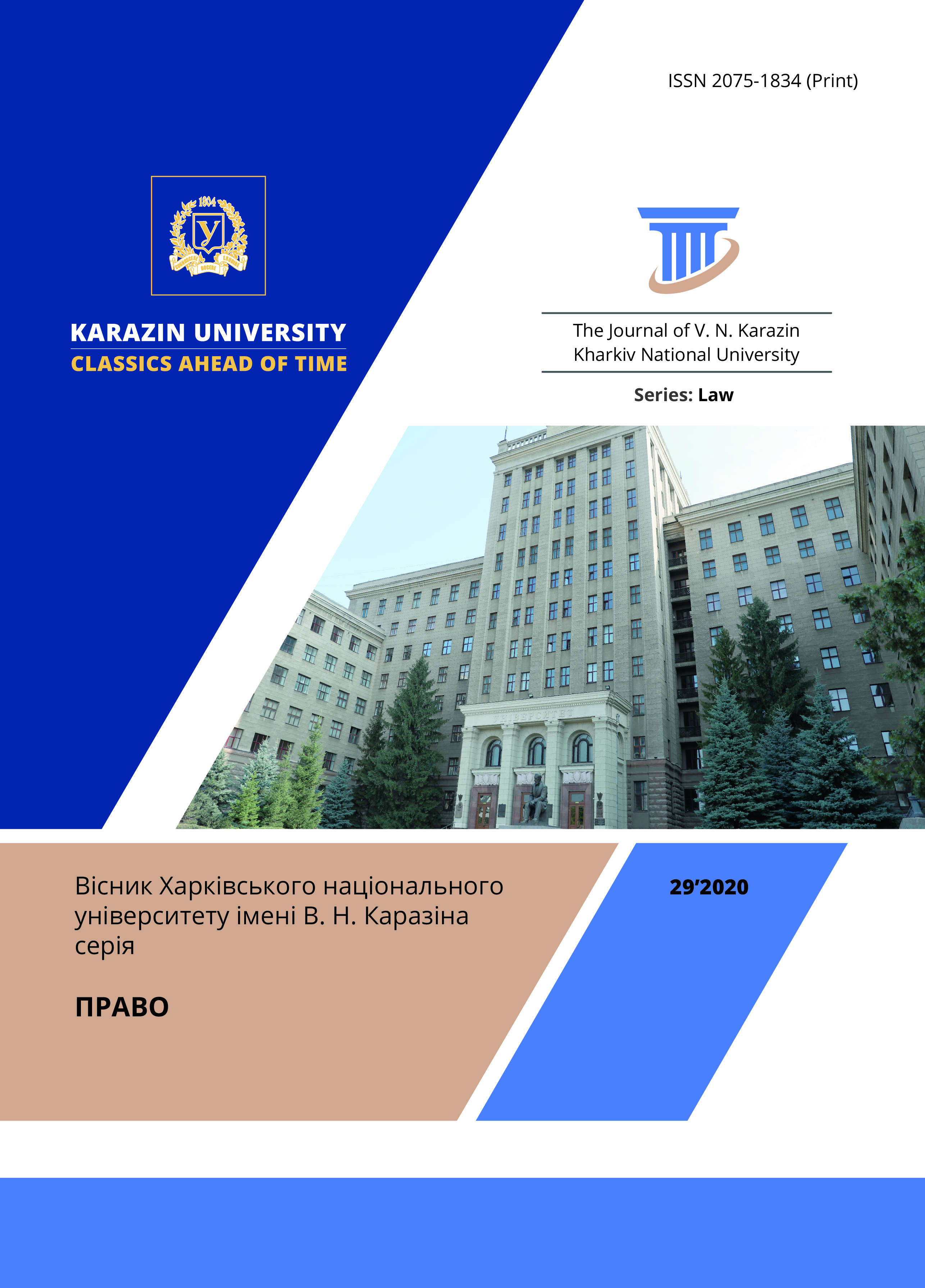LEGAL REALISM AS DIRECTION OF SOCIOLOGICAL JURISPRUDENCE
Abstract
ANNOTATION: The article is devoted to the disclosure of features of legal realism as a special direction of sociological jurisprudence. The historical prerequisites for the formation of American legal realism are considered. It was emphasized that legal realism emerged as a reaction to the formal principle of adjudication, which insisted on the need for strict adherence to case law. The leader of American legal formalism, K. Langdell, viewed law as a combination of legal concepts derived by inductively generalizing previous court decisions. It has been proven that one of the first to disagree with this approach was judges of U.S. Supreme Court Justice O. Holmes and B. Cardozo. A comparative analysis of the views of K. Llewellyn and J. Frank, who are recognized leaders of the movement of legal realism, was done. It was established that K. Llewellyn considered that law is not only the judge decide but also any other persons with powers over the disputes. He paid particular attention to the study of the activities of the High Courts and emphasized the need to use the so-called Grand-style in the judicial decision-making process, which allows the law to be adapted to the real circumstances of the case and to contemporary social change. In contrast, J. Frank insisted that the judge was the creator of the law, and that the courts of first instance played a major role in the administration of justice. In his opinion, one of the decisive factors in the administration of justice is the personality of the judge, his individual and psychological qualities. It has been found that despite the lack of unity of positions of the supporters of legal realism, they are united by the underestimation of positive law as a factor of certainty and stability of legal relations, an instrumental approach to law and excessive psychologization of the judicial process. It is concluded that despite the significant shortcomings inherent in legal realism, this line of legal thought has made a significant impact on the general theory and philosophy of law through the combination of methods of sociological and psychological study of legal reality and the disclosure of internal mechanisms of formation judicial decisions.
Downloads
References
2. Holmes O. W. Jr. The Common Law. Boston: Little, Brown, and Company, 1881. 422 p.
3. Антонов М. В. Правовой реализм и становление экономического анализа права. Современные подходы к пониманию права и их влияние на развитие отраслевой юридической науки, законодательства и правоприменительной практики : сб. науч. тр. / под общ. ред. В. И. Павлова, А. Л. Савенка. Минск : Академия МВД, 2017. С. 7-16.
4. Holmes O. W. Privilege, Malice, and Intent. Harvard Law Review. 1894. Vol. 8, No. 1. Р. 1-14.
5. Holmes O. W. The Path of the Law. Harvard Law Review. 1897. Vol. 10. P. 457-478.
6. Титов В. Теоретичні погляди Олівера Венделла Холмса молодшого. Вісник Академії правових наук України. 2010. № 3. С. 137-150.
7. Cardozo B. N. The Nature of the Judicial Process. New Haven: Yale University Press, 1921. 188 р.
8. Титов В. Д. Внесок Бенджаміна Кардозо в американську юриспруденцію. Вісник Академії правових наук України. 2011. № 2. С. 76–85.
9. Oliphant H. A Return to Stare Decisis. American Bar Association Journal. 1928. Vol. 14, № 2. P. 71-76.
10. Llewellyn K. N. The Bramble Bush: On Our Law and Its Study. N.Y.: Oceana Publications, 1930. 160 р.
11. Тонков Д. Е. Американский правовой реализм: правовая определенность с позиции нормоскептиков. Правоведение. 2015. № 4. С. 137-153.
12. Frank J. Law and the Modern Mind. New York: Brentano's, 1930. 362 p.
13. Кузнєцов В. І. Філософія права. Історія та сучасність. К. : ВД «Стилос»: ПІД «Фоліант», 2003. 382 с.
14. Frank J. Mr. Justice Holmes and Non-Eucledean Legal Reasoning. Cornell Law Quarterly. 1936. Vol. 12. P. 568-603.
15. Адыгезалова Г. Э. Социологическая юриспруденция США в XX веке : формирование доктрины, развитие и совершенствование правопорядка. СПб. : Изд-во «Юридический центр-Пресс», 2012. 270 с.
16. Pound R. Social control through law. New Haven : Yale Univ. Press; Oxford Univ. Press, 1942. 138 p.
17. Козюбра М. Теорія юридичної аргументації та її особливості в конституційному судочинстві. Вісник Конституційного Суду України. 2016. № 6. С. 167-180.
18. Калінін С. А. Інструментальне розуміння права в контексті суб’єктного підходу : щодо проблеми взаємодії методологічних стратегій. Філософія права і загальна теорія права. 2014. № 1–2. С. 239-252.
19. Сокіл У. В. Роль інтуїції судді при прийнятті судових рішень у філософії американського правового реалізму. Наше право. 2016. № 1. С. 13-16.
20. Hutcheson J. C. The Judgment Intuitive: the Function of the «Hunch» in Judicial Decision. Cornell Law Quarterly. 1929. Vol. 14. P. 274–288.
21. Гураленко Н. А. Ціннісно-смислові константи суддівського пізнання : дис. … д-ра юрид. наук : 12.00.12. Чернівці, 2017. 393 с.
Copyright (c) 2020 Oleksandr Voloshenyuk

This work is licensed under a Creative Commons Attribution 4.0 International License.




